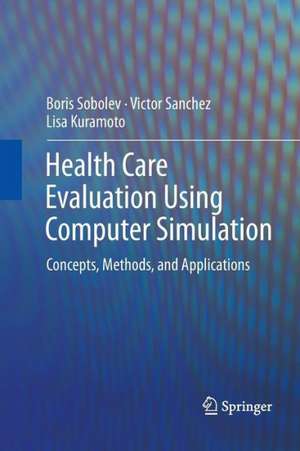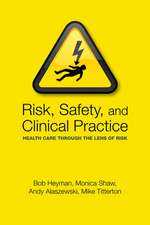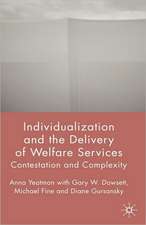Health Care Evaluation Using Computer Simulation: Concepts, Methods, and Applications
Autor Boris Sobolev, Victor Sanchez, Lisa Kuramotoen Limba Engleză Paperback – 7 aug 2014
| Toate formatele și edițiile | Preț | Express |
|---|---|---|
| Paperback (1) | 1101.73 lei 6-8 săpt. | |
| Springer Us – 7 aug 2014 | 1101.73 lei 6-8 săpt. | |
| Hardback (1) | 1108.87 lei 6-8 săpt. | |
| Springer Us – 11 iul 2012 | 1108.87 lei 6-8 săpt. |
Preț: 1101.73 lei
Preț vechi: 1159.71 lei
-5% Nou
Puncte Express: 1653
Preț estimativ în valută:
210.85€ • 219.55$ • 178.19£
210.85€ • 219.55$ • 178.19£
Carte tipărită la comandă
Livrare economică 10-24 martie
Preluare comenzi: 021 569.72.76
Specificații
ISBN-13: 9781489993229
ISBN-10: 1489993223
Pagini: 432
Ilustrații: XXVI, 406 p.
Dimensiuni: 155 x 235 x 23 mm
Greutate: 0.6 kg
Ediția:2012
Editura: Springer Us
Colecția Springer
Locul publicării:New York, NY, United States
ISBN-10: 1489993223
Pagini: 432
Ilustrații: XXVI, 406 p.
Dimensiuni: 155 x 235 x 23 mm
Greutate: 0.6 kg
Ediția:2012
Editura: Springer Us
Colecția Springer
Locul publicării:New York, NY, United States
Public țintă
ResearchCuprins
Part I. Care processes.- Chapter 1. Introduction.- Chapter 2. Different views of care process.- Chapter 3. Taxonomy of peri-operative activities.- Chapter 4. UML diagrams for describing care processes.- Part II. Simulation Methods.- Chapter 5. Review of approaches to simulation in healthcare.- Chapter 6. Discrete-event simulation of patient flow.- Part III. Planning Experiment.- Chapter 7. Framework of intervention study.- Chapter 8. Design of a simulation study.- Chapter 9. Performance measures at the cluster level.- Chapter 10. Performance measures at the patient level.- Part IV. Evaluation Using Simulation Experiments.- Chapter 11. Reporting results of a simulation study.- Chapter 12. Evaluation at the cluster level.- Chapter 13. Evaluation at the patient level.- Part V. Case Studies.- Chapter 14. The simulation model.- Chapter 15. Pooled appointment lists.- Chapter 16. Shortest appointment list.- Chapter 17. Pre-booking elective cases.- Chapter 18. Pre-surgical screening.- Chapter 19. Anesthesiology consultations.- Chapter 20. Managing ICU beds.- Chapter 21. Discharge planning.
Textul de pe ultima copertă
Boris Sobolev · Victor Sanchez · Lisa Kuramoto
Health Care Evaluation Using Computer Simulation
Concepts, Methods, and Applications
Over the past decades, health services research has informed policy for improving health care delivery. Computer simulations have great potential to drive full scale improvement, yet the technology has rarely been used to evaluate proposed changes before they are implemented in health care systems.
Health Care Evaluation Using Computer Simulation describes a new interdisciplinary approach, one that incorporates the simulation of health system operations into the paradigm of health services research. Beginning by reviewing the processes of health care evaluation and simulation experiments, the book presents a complete methodology for conducting simulation studies for evaluating policy alternatives. Unified Modeling Language and Statechart diagramming are introduced as a means for developing realistic requirements of discrete-event models and policies. And to clearly illustrate simulation modeling in context, an extended series of examples illustrates the use of simulations throughout a single department in a busy hospital.
Chapters take the reader through each step of the methodology, featuring:
• A comparison of approaches to constructing simulation models of health care systems.
• An overview geared toward developing research questions.
• A framework for determining model requirements and designing simulations.
• Methods for evaluating simulation experiments at the cluster and individual levels.
• Guidelines for clear reporting of simulation studies.
• Examples of computer simulation in surgical services, from appointment booking to discharge planning.
As a research reference and a hands-on blueprint, Health Care Evaluation Using Computer Simulation breaks innovative new ground for researchers and graduate students in health services research and health care management.
Over the past decades, health services research has informed policy for improving health care delivery. Computer simulations have great potential to drive full scale improvement, yet the technology has rarely been used to evaluate proposed changes before they are implemented in health care systems.
Health Care Evaluation Using Computer Simulation describes a new interdisciplinary approach, one that incorporates the simulation of health system operations into the paradigm of health services research. Beginning by reviewing the processes of health care evaluation and simulation experiments, the book presents a complete methodology for conducting simulation studies for evaluating policy alternatives. Unified Modeling Language and Statechart diagramming are introduced as a means for developing realistic requirements of discrete-event models and policies. And to clearly illustrate simulation modeling in context, an extended series of examples illustrates the use of simulations throughout a single department in a busy hospital.
Chapters take the reader through each step of the methodology, featuring:
• A comparison of approaches to constructing simulation models of health care systems.
• An overview geared toward developing research questions.
• A framework for determining model requirements and designing simulations.
• Methods for evaluating simulation experiments at the cluster and individual levels.
• Guidelines for clear reporting of simulation studies.
• Examples of computer simulation in surgical services, from appointment booking to discharge planning.
As a research reference and a hands-on blueprint, Health Care Evaluation Using Computer Simulation breaks innovative new ground for researchers and graduate students in health services research and health care management.
Health Care Evaluation Using Computer Simulation
Concepts, Methods, and Applications
Over the past decades, health services research has informed policy for improving health care delivery. Computer simulations have great potential to drive full scale improvement, yet the technology has rarely been used to evaluate proposed changes before they are implemented in health care systems.
Health Care Evaluation Using Computer Simulation describes a new interdisciplinary approach, one that incorporates the simulation of health system operations into the paradigm of health services research. Beginning by reviewing the processes of health care evaluation and simulation experiments, the book presents a complete methodology for conducting simulation studies for evaluating policy alternatives. Unified Modeling Language and Statechart diagramming are introduced as a means for developing realistic requirements of discrete-event models and policies. And to clearly illustrate simulation modeling in context, an extended series of examples illustrates the use of simulations throughout a single department in a busy hospital.
Chapters take the reader through each step of the methodology, featuring:
• A comparison of approaches to constructing simulation models of health care systems.
• An overview geared toward developing research questions.
• A framework for determining model requirements and designing simulations.
• Methods for evaluating simulation experiments at the cluster and individual levels.
• Guidelines for clear reporting of simulation studies.
• Examples of computer simulation in surgical services, from appointment booking to discharge planning.
As a research reference and a hands-on blueprint, Health Care Evaluation Using Computer Simulation breaks innovative new ground for researchers and graduate students in health services research and health care management.
Over the past decades, health services research has informed policy for improving health care delivery. Computer simulations have great potential to drive full scale improvement, yet the technology has rarely been used to evaluate proposed changes before they are implemented in health care systems.
Health Care Evaluation Using Computer Simulation describes a new interdisciplinary approach, one that incorporates the simulation of health system operations into the paradigm of health services research. Beginning by reviewing the processes of health care evaluation and simulation experiments, the book presents a complete methodology for conducting simulation studies for evaluating policy alternatives. Unified Modeling Language and Statechart diagramming are introduced as a means for developing realistic requirements of discrete-event models and policies. And to clearly illustrate simulation modeling in context, an extended series of examples illustrates the use of simulations throughout a single department in a busy hospital.
Chapters take the reader through each step of the methodology, featuring:
• A comparison of approaches to constructing simulation models of health care systems.
• An overview geared toward developing research questions.
• A framework for determining model requirements and designing simulations.
• Methods for evaluating simulation experiments at the cluster and individual levels.
• Guidelines for clear reporting of simulation studies.
• Examples of computer simulation in surgical services, from appointment booking to discharge planning.
As a research reference and a hands-on blueprint, Health Care Evaluation Using Computer Simulation breaks innovative new ground for researchers and graduate students in health services research and health care management.
Caracteristici
Reviews approaches to simulation in health care
Includes discussion of an analytical framework for a simulation study
Presents a comprehensive methodology for planning computer simulation experiments
Offers examples of policy evaluation in surgical care
Includes discussion of an analytical framework for a simulation study
Presents a comprehensive methodology for planning computer simulation experiments
Offers examples of policy evaluation in surgical care












